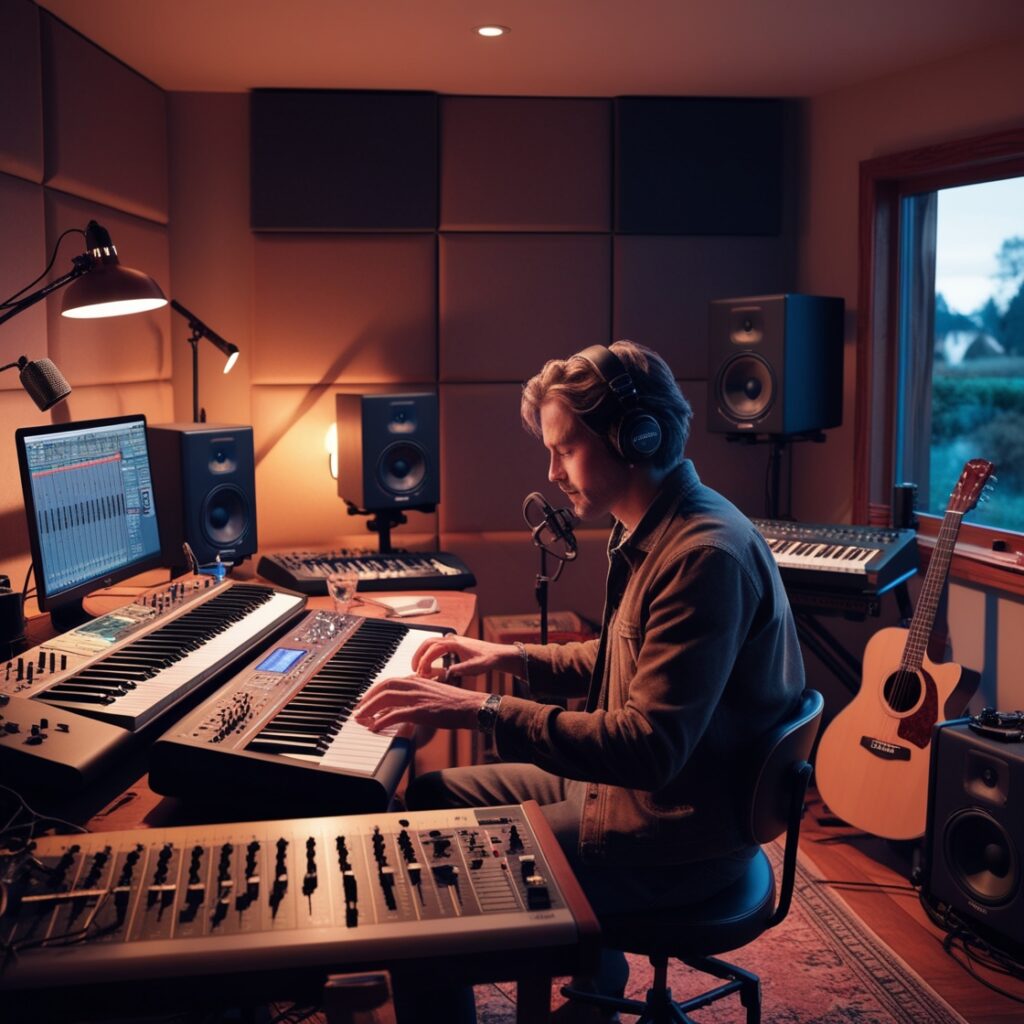
Music has the power to move people emotionally, connect cultures, and inspire creativity. If you’re passionate about music and have the talent to create, perform, or teach, you’re already sitting on a potential goldmine. The key is knowing how to leverage that passion into profit. In today’s digital world, musicians have access to a variety of platforms and strategies that make earning money with music more achievable than ever before. This article will walk you through multiple ways to make money with music, giving you detailed insights into platforms, strategies, and real-life examples.
Why Turn Your Music Passion into Profit?
Turning your love for music into a profitable venture provides both emotional fulfillment and financial independence. Whether you’re a beginner or an experienced artist, finding ways to monetize your music means you can invest more time in your craft. Here’s why it’s important:
- Financial Security: Having a steady income stream allows you to focus more on music without worrying about financial stress.
- Creative Freedom: By earning through music, you gain control over your creative process without needing to compromise for traditional jobs.
- Longevity: The more ways you find to make money with your music, the longer you can sustain a career doing what you love.
But how do you actually do it? Below, we’ll break down various methods, platforms, and tips to help you start making money with music.
Find Your Unique Niche in Music
Before diving into different platforms and methods, it’s important to figure out what sets you apart as a musician. Ask yourself:
- Are you a singer-songwriter, producer, or instrumentalist?
- Do you enjoy composing music for film and TV, or are you more inclined to perform live shows?
Identifying your niche will help you focus your efforts on the strategies that suit your strengths.
Example: If you’re a skilled guitarist, you might specialize in offering guitar lessons, composing background tracks, or playing gigs. On the other hand, if you’re a producer, platforms like SoundCloud or YouTube are better suited for showcasing your beats and music production skills.
Using Online Platforms to Make Money with Music
Online platforms are essential for musicians looking to monetize their craft in the digital age. Below are some of the most popular and effective platforms for making money with music.
Spotify for Artists
Spotify is one of the most popular streaming platforms globally, and for good reason—it’s easy to use, widely accessible, and provides artists with a way to earn through streams. You can upload your tracks to Spotify via distribution services like DistroKid, CD Baby, or TuneCore. Once your music is available on Spotify, you earn money based on how many streams your songs receive.
Earning Potential on Spotify
On average, artists earn about $0.003 to $0.005 per stream. While this might not seem like much, it can add up quickly with enough plays. For instance, if you generate 100,000 streams on a track, you could earn between $300 and $500.
Growing Your Audience on Spotify
Building a loyal listener base is the key to maximizing your earnings on Spotify. Here’s how you can grow your audience:
- Collaborate with Other Artists: Feature other musicians on your tracks or remix popular songs to reach new listeners.
- Create Playlists: Build playlists with your music alongside other songs in similar genres. Share these playlists on social media or embed them on your website.
- Promote on Social Media: Regularly post about your releases on platforms like Instagram, TikTok, or Twitter to drive traffic to your Spotify page.
YouTube for Musicians
YouTube offers musicians a platform to showcase their work and reach a massive audience. Beyond just uploading music videos, YouTube allows you to monetize your channel through ads, memberships, and fan donations via Super Chats during live streams.
Monetizing Your YouTube Channel
Once your YouTube channel meets the eligibility requirements (1,000 subscribers and 4,000 watch hours in the past 12 months), you can apply for the YouTube Partner Program, which allows you to earn through ads displayed on your videos.
Here’s how you can maximize your earnings on YouTube:
- Upload Consistently: Post music videos, behind-the-scenes content, tutorials, or vlogs to engage your audience and keep them coming back.
- Engage with Your Audience: Respond to comments, ask questions in your videos, and encourage viewers to subscribe and share your content.
- Explore Brand Partnerships: Once you have a following, you can collaborate with brands for sponsorship deals, where you feature their products in your videos.
Selling Music on iTunes and Amazon
In addition to streaming, selling digital downloads on platforms like iTunes and Amazon offers musicians a direct way to earn money. The payout for each sale is higher than what you’d get from streaming, making this an important income stream for artists with a dedicated fan base.
Getting Your Music on iTunes and Amazon
To get your music on these platforms, you’ll need to use a distribution service like DistroKid or CD Baby, which handles the upload and listing process for you. Once your music is live, promote it to your fans via social media, email lists, or live shows.
Example of Earnings
For example, let’s say you price your album at $9.99 on iTunes. After Apple takes their 30% cut, you’d earn around $7 per sale. Selling 100 albums would net you about $700, which is a much faster way to earn compared to streaming alone.
Freelancing as a Musician

Freelancing offers musicians a way to use their skills on a project-by-project basis, allowing for flexible work arrangements. Whether you compose, perform, or produce, freelancing can open up a variety of income streams.
Freelance Platforms for Musicians
Websites like Fiverr, Upwork, and SoundBetter allow musicians to offer their services to clients worldwide. Common freelance gigs for musicians include:
- Composing music for video games, podcasts, or films
- Recording instrumental tracks for other artists
- Mixing and mastering tracks for clients
- Teaching music lessons online
Example of Freelance Work on Fiverr
On Fiverr, musicians can offer services like composing a custom jingle for $50 or recording a session guitar track for $100. Successful freelancers often build a reputation over time through positive reviews and referrals. For instance, a session guitarist might earn $200 for each track they record, and by completing multiple gigs a month, they could make a significant side income.
Teaching Music Online
If you’re skilled in an instrument or production technique, teaching others is another fantastic way to make money. Teaching can be done in person or online, and many platforms allow you to create and sell music courses.
Platforms for Teaching Music
Platforms like Udemy, Teachable, and Skillshare let musicians create online courses that students can purchase. Alternatively, you can offer private lessons via Zoom or Skype for a more personalized teaching experience.
Creating a Course on Udemy
Udemy is one of the largest online learning platforms, offering courses on everything from guitar lessons to music production. To create a course on Udemy, you need to:
- Plan Your Course Content: Break down your lessons into structured modules, including video lessons, assignments, and quizzes.
- Record High-Quality Videos: Ensure your videos are visually and audibly clear to provide the best learning experience.
- Market Your Course: Promote your course on social media, your website, or through email newsletters to attract students.
Example of Earnings from Teaching
For example, if you create a “Beginner’s Guide to Music Production” course and sell it for $100, Udemy typically takes a 50% cut. If 200 students purchase your course, you could earn $10,000, which is a great income stream with minimal ongoing work.
Live Performances and Virtual Concerts
While in-person performances are traditional revenue sources, virtual concerts have gained immense popularity in recent years. Platforms like Stageit, Twitch, and Patreon allow musicians to perform live for their audience online and earn money through ticket sales or fan donations.
Hosting Virtual Concerts
Virtual concerts give musicians the chance to perform live without the need for a physical venue. Here’s how you can earn from virtual shows:
- Sell Tickets: Platforms like Stageit allow you to set a ticket price for your virtual concert, and fans can purchase access to your performance.
- Receive Tips and Donations: On Twitch, fans can donate directly to you during your performance, providing additional income.
Example of Virtual Concert Earnings
For example, if you charge $5 per ticket for a virtual concert and 500 fans attend, you’d make $2,500 from just one performance. Add in tips and donations, and your earnings could be even higher.
Licensing Your Music
Licensing your music for use in TV shows, films, advertisements, or video games can be one of the most lucrative ways to earn. Licensing deals often provide both upfront payments and royalties, allowing you to earn every time your song is played.
How to License Your Music
To get started with music licensing, you can upload your tracks to licensing platforms like AudioJungle, Pond5, or Musicbed. These platforms make your music available to filmmakers, advertisers, and game developers searching for the perfect soundtrack.
Example of Sync Licensing
Sync licensing involves placing your music in TV shows or movies. For example, if a television show licenses your song, you could receive a flat fee of $1,000 upfront, plus ongoing royalties every time the episode airs.
Crowdfunding Your Music Career
Crowdfunding has become an increasingly popular way for musicians to fund their projects by connecting directly with their fans. Platforms like Kickstarter and Patreon allow you to offer exclusive content in exchange for fan support.
Patreon for Musicians
On Patreon, musicians can offer tiered subscription options where fans pledge a monthly amount in exchange for rewards like early access to music, exclusive behind-the-scenes content, or even personalized songs.
Example of Crowdfunding Success
Let’s say you have 500 fans who each pledge $5 per month on Patreon. That’s $2,500 in monthly recurring revenue, which can help you fund new projects, cover recording costs, or even pay for promotion.
Building Your Brand as a Musician

Your personal brand as a musician is key to attracting a loyal audience and maximizing your income. It’s important to maintain a consistent message across all platforms, whether it’s your social media, website, or album artwork.
Why Your Brand Matters
A strong brand helps fans connect with you on a deeper level, making them more likely to support your work financially. Share your journey, struggles, and successes with your audience to create a sense of authenticity.
Conclusion
Making money with music is not only possible but more accessible than ever. Whether you’re selling tracks on streaming platforms, freelancing, teaching, or licensing your work, there are endless ways to turn your passion for music into a profitable venture. The key is to diversify your income streams and remain consistent in your efforts. By leveraging the platforms and strategies outlined in this guide, you can build a sustainable career in music and live your dream every day.
FAQs
- How much can I earn from Spotify streams?
On average, artists earn $0.003 to $0.005 per stream. While it may seem low, building a large listener base can lead to substantial earnings over time. - What’s the best platform for selling my music?
Platforms like iTunes and Amazon allow you to sell your music directly, often providing a higher payout per sale compared to streaming services. - Can I teach music without formal qualifications?
Yes! Many successful music teachers build their reputations based on experience and skill, offering lessons online or through platforms like Udemy and Teachable. - How can I get my music licensed for TV or film?
You can upload your tracks to music licensing platforms like AudioJungle or Pond5, or reach out directly to music supervisors who work on film and TV projects. - What’s the fastest way to build a following as a musician?
Engaging with your audience on social media, collaborating with other musicians, and consistently releasing high-quality content are all effective ways to grow your following.

Jordan Blake, the administrator of Extra Cash Tips, is passionate about discovering the best tips and strategies for making money online. With extensive experience in personal finance and digital marketing, he is dedicated to helping readers achieve financial independence through valuable and practical content





